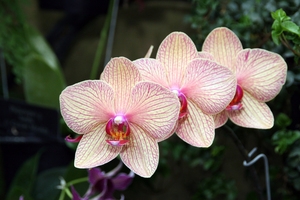Member Plants
2 plants cultivated by members of ORCHIDS.ORG. See All Member PlantsUpcoming Global Events

24th World Orchid Conference, Germany
There are currently no photos of plants of
Oncidium chrysopyramis
for sale by members of ORCHIDS.ORG.
Below are other recent plants for sale:
Log in to Add a Comment

Author is Ken Slump, posted about 5 years ago
A 12-Step Plan for Becoming a Successful Orchid Grower
IF YOU ARE NEW TO THE ORCHID hobby and perhaps feel you are not enjoying the success with your plants that you had hoped for, read throug...
Read More

Author is Roy Tokunaga, posted over 5 years ago
We take water for granted. It falls out of the sky. It flows from the faucet. Oahu city water is considered good for growing Orchids. We use it without thought or concern.
If you study orch...
Read More
Do you have a plant for sale or trade
which you cannot ship or do not want to bother shippping?
No problem.
Click here to make a local-only offer.
It's a free service to our members.
Orchid Species: Oncidium chrysopyramis
Kew currently accepted name is Oncidium ornithorhynchum
Oncidium chrysopyramis is an orchid species identified by Rchb.f. & Warsz. in 1854. Culture information and photos for this orchid are commonly detailed under the currently accepted name of Oncidium ornithorhynchum.
Genus
Oncidium (Onc.)
Grex
chrysopyramis
Parents
Species
Author
Rchb.f. & Warsz.
Year
1854
ORIGIN: A small sized, cold growing epiphytic species from Colombia, Ecuador and Peru found at altitudes of 2000 to 3300 meters in the western slopes of the Cordillera Oriental.
DESCRIPTION: A small sized, cold growing epiphytic species from Colombia, Ecuador and Peru found at altitudes of 2000 to 3300 meters in the western slopes of the Cordillera Oriental and blooms in the summer in Bogata' and has ovoid to cylindrical, compressed, unifoliateto trifoliate pseudobulbs with oblanceolate to elliptic-oblong acute or acuminate leaves that blooms mostly in the summer on a erect to pendant, to 20 [50 cm] long, shortly paniculate inflorescence carrying many fragrant, canary yellow flowers and a few interspersed throughout, sterlie star shaped flowers.
FLOWER SIZE: 1 inch [2.5 cm] -- information provided by Jay Pfahl, author of the Internet Orchid Species Encyclopedia (IOSPE).
DESCRIPTION: A small sized, cold growing epiphytic species from Colombia, Ecuador and Peru found at altitudes of 2000 to 3300 meters in the western slopes of the Cordillera Oriental and blooms in the summer in Bogata' and has ovoid to cylindrical, compressed, unifoliateto trifoliate pseudobulbs with oblanceolate to elliptic-oblong acute or acuminate leaves that blooms mostly in the summer on a erect to pendant, to 20 [50 cm] long, shortly paniculate inflorescence carrying many fragrant, canary yellow flowers and a few interspersed throughout, sterlie star shaped flowers.
FLOWER SIZE: 1 inch [2.5 cm] -- information provided by Jay Pfahl, author of the Internet Orchid Species Encyclopedia (IOSPE).
Other Names
| Genus Name | Genus | Grex Name | Year | Author | |
|---|---|---|---|---|---|
| Add+ | Oncidium | Onc | ornithorhynchum | 1816 | Kunth in F.W.H.von Humboldt |
| Add+ | Oncidium | Onc | maderoi | 1920 | Schltr. |
| Add+ | Oncidium | Onc | pyramidale | 1845 | Lindl. |
Most awarded/recent cultivars:
Onc. ornithorhynchum 'Cilla'
(2 awards in
1991)
Onc. ornithorhynchum 'Sellon'
(2 awards from
1978
to
1990)
Onc. ornithorhynchum 'Sutherland'
(2007)
Onc. ornithorhynchum 'Clown Alley'
(2001)
Onc. ornithorhynchum 'Tinonee'
(2000)
Onc. ornithorhynchum 'Stinky Pinky'
(1995)
Onc. ornithorhynchum 'Jessica Maree'
(1994)
Onc. ornithorhynchum 'Pink Delight'
(1993)
Onc. ornithorhynchum 'Brennon'
(1987)
Onc. ornithorhynchum 'Royale'
(1985)
Onc. ornithorhynchum 'Davie Ranches'
(1975)
Onc. ornithorhynchum 'Jean'
(1974)
Onc. ornithorhynchum 'Kukoup'
(1971)
Featured Site Articles
Read Latest Articles
Beginners Start Here

Water: The Most Important Nutrient
New Topics
- Al Schotz asked question Gomesa bifolia in category General Discussion
- Kjell Meershoek started topic Re-inventing an orchidarium.. your thoughts in category Curiosity
- David George asked question Odom's Fascination - an unusual orchid in category General Discussion
- Carol Holdren asked question Grow Tent in the Garage in category General Discussion
- David George asked question rlc Caotan Beauty found at Home Depot in category Cattleya Alliance
New Comments
- Kjell Meershoek commented on topic "Re-inventing an orchidarium.. your thoughts" by Kjell Meershoek
- Inga Kruppa commented on member plant Acacallis cyanea Х Paradisanthus micranthus by Inga Kruppa
- Carol Holdren commented on topic "rlc Caotan Beauty found at Home Depot " by David George
- Carol Holdren commented on topic "Odom's Fascination - an unusual orchid" by David George
- Dr. Florian Wolf commented on topic "Wild. Lisa Devos" by Maria Fernandez
- Michael Valcarcel commented on member plant Rlc. Chief Takanaka by Walceli Muniz Valverde
- Michael Valcarcel commented on member plant Rlc. Montana Spirit by Michael Valcarcel
- Michael Valcarcel commented on member plant Ctt. Blazing Sun by Michael Valcarcel
- Michael Valcarcel commented on member plant Bc. Spotted Clown by Michael Valcarcel
- Maria Skrypnyk commented on member plant Yamadara Redland Sunset by Maria Skrypnyk
- André Pessina commented on topic "Odontocidium Orchid fungus?" by Kristin Dorris
- Linda Hartman commented on topic "Image of a plant please" by Leshya Perkins
- Paul Reavis commented on orchid Milt. Kismet
- Christiaan Viljoen commented on member plant Psh. fragrans by Christiaan Viljoen
- Christiaan Viljoen commented on member plant Z. maculatum by Christiaan Viljoen
- Christiaan Viljoen commented on member plant C. Gaskell-Pumila 'Azure Star' by Christiaan Viljoen
- Robert H. Findlay commented on member plant Rlc. Joy Sokabe var. Volcano Queen by Sally K
- James Lunsford commented on member plant Lc. Sagarik Wax 'African Beauty AMO/AOS x Blc. Cherry Suisse'Kauai' HCC/AOS var. Cattlyea 'Hybrid ' by James Lunsford
- John Varigos commented on orchid Bulb. schwarzii
- Linda Hartman commented on topic "Issue with Blc. Ben O'Neil "Jubilee" by Glenda Ratliff




